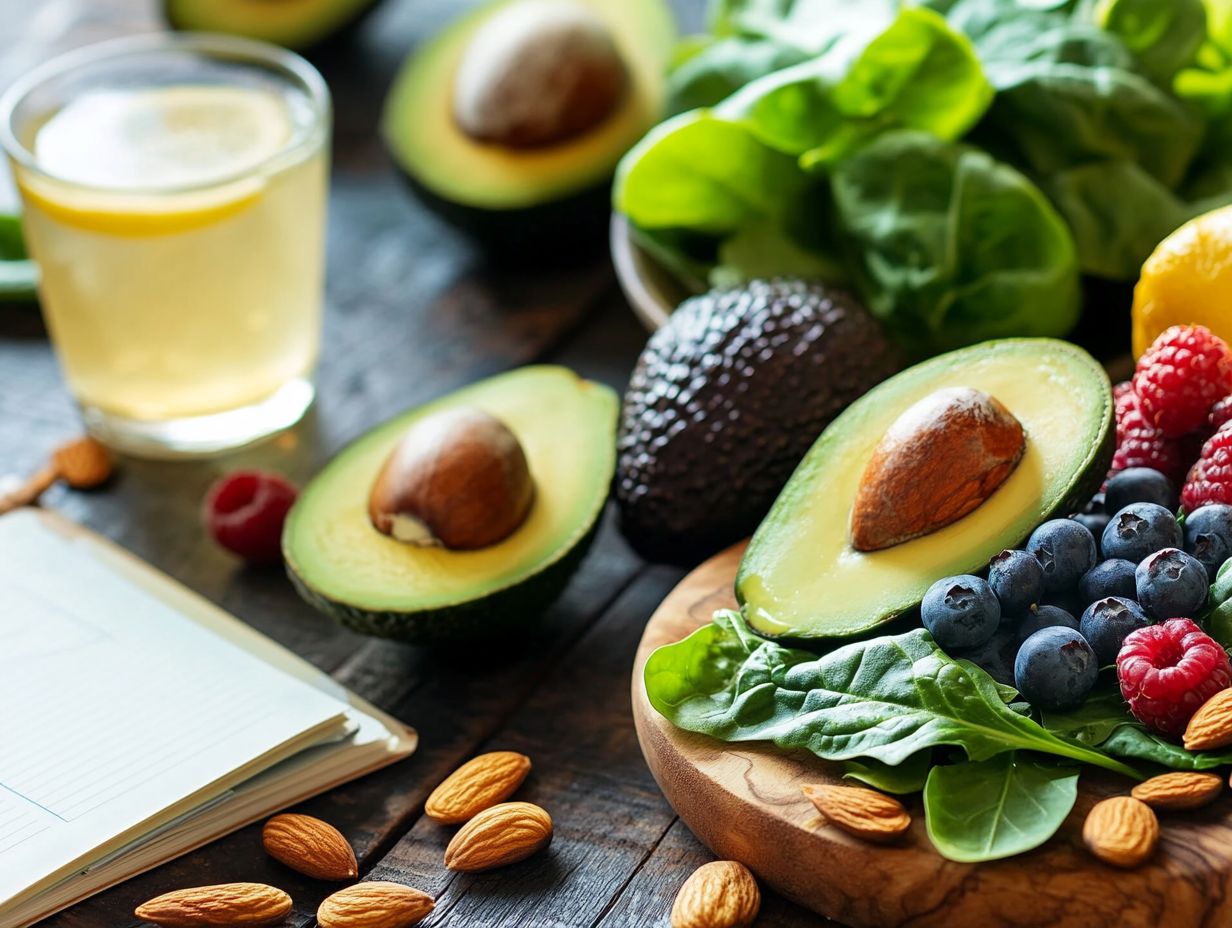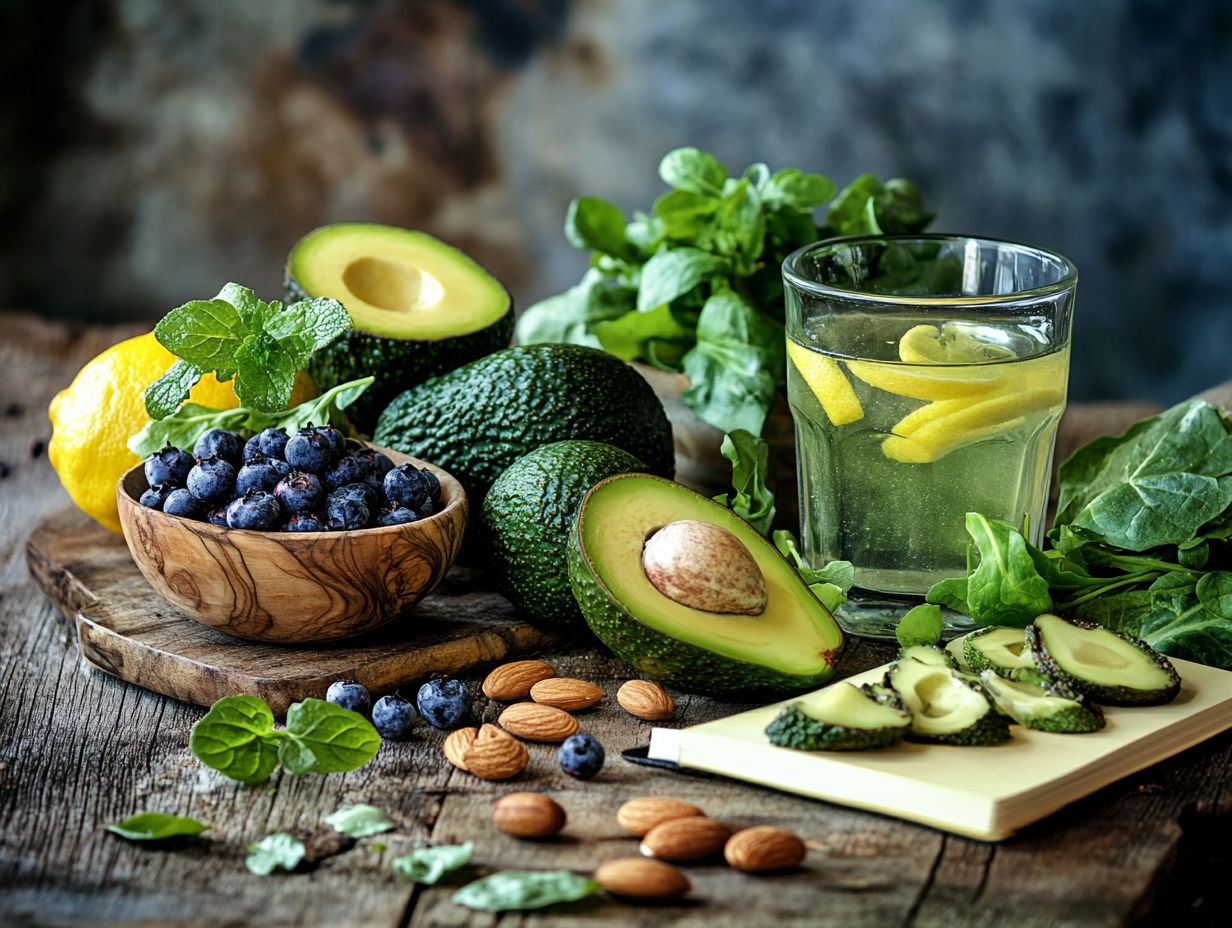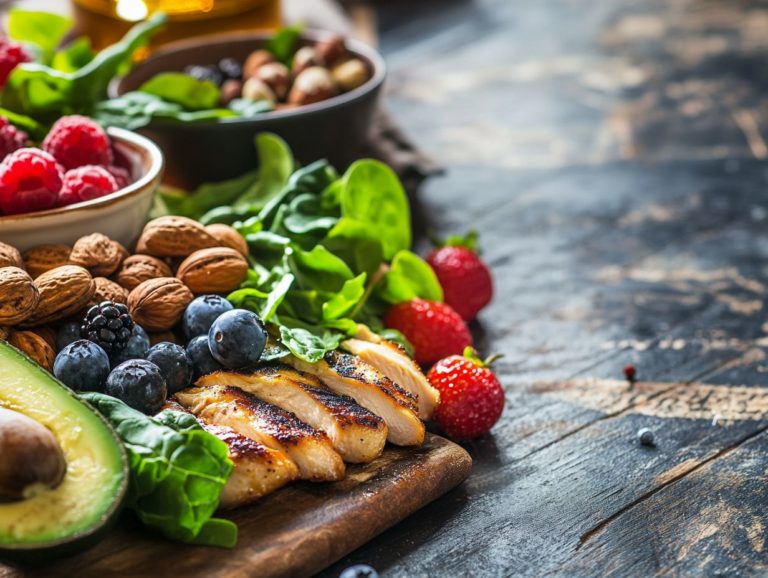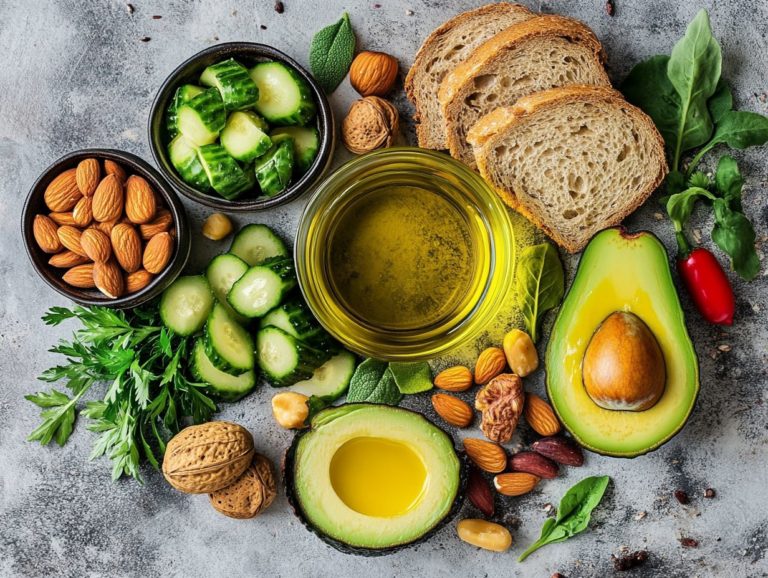The Interplay of Nutrition and Ketosis
Are you intrigued by ketosis and its effects on health, nutrition, and body composition? Join us as we explore the exciting world of ketosis! Let s dive in and discover how you can transform your health through ketosis!
This exploration delves into the captivating realm of ketosis, examining its different forms and the mechanisms behind it. Uncover the benefits of this body condition, the significance of nutrition, the dietary guidelines to follow, and the ideal foods that will support your ketogenic journey.
Discover how to reach and sustain ketosis, as well as the potential side effects you might encounter and strategies to minimize them. Whether you re a newcomer to the ketogenic diet, seeking weight loss strategies, or looking for ketogenic resources to enhance your knowledge, this guide is tailored for you!
Contents
- Key Takeaways from Ketosis:
- What Is Ketosis? Understanding the Metabolic Changes
- How Does Ketosis Work?
- What Are The Benefits Of Ketosis?
- What Is The Role Of Nutrition In Ketosis?
- What Are The Best Foods To Eat On A Ketogenic Diet?
- What Foods Should You Avoid on a Ketogenic Diet?
- Achieving Ketosis: A Step-by-Step Guide
- What Are The Potential Side Effects Of Ketosis?
- How Does Nutrition Affect The Side Effects Of Ketosis?
- How Can You Maintain Ketosis?
- What Are The Best Practices To Sustain Ketosis?
- What Are The Common Mistakes To Avoid In A Ketogenic Diet?
- Frequently Asked Questions
- 1. How do nutrition and ketosis work together?
- 2. How does nutrition affect ketosis?
- 3. Can any type of food help with ketosis?
- 4. What are the benefits of the interplay between nutrition and ketosis?
- 5. Are there any risks or side effects of being in a state of ketosis?
- 6. Is a ketogenic diet suitable for everyone?
Key Takeaways from Ketosis:

- Ketosis is a body condition where the body uses fat as its primary source of energy instead of carbohydrates.
- The ketogenic diet, which is high in healthy fats and low in carbohydrates, is the most common method to achieve ketosis.
- Proper nutrition is crucial in maintaining ketosis and minimizing potential side effects.
What Is Ketosis? Understanding the Metabolic Changes
Ketosis is a fascinating body condition where your body shifts its primary energy source from carbohydrates to fat. This transition leads to notable changes in insulin levels and energy production.
You can induce this state through various dietary strategies, especially the ketogenic diet. This diet focuses on a high fat and low carbohydrate intake.
This approach helps in regulating blood glucose levels and enhancing fat metabolism. In ketosis, your liver converts fatty acids into ketones, which become a vital fuel for your brain and other organs. This not only promotes fat metabolism but also supports your weight management goals.
Grasping the concept of ketosis is essential, whether you’re a health enthusiast or someone looking to tackle obesity or other metabolic conditions like diabetes and cancer.
What Are The Different Types Of Ketosis?
You might find several types of ketosis, such as natural ketosis, nutritional ketosis, and fasting ketosis, each presenting unique mechanisms and effects on your body. These different types have implications for both short-term benefits and long-term effects on your health.
Natural ketosis typically manifests during prolonged exercise or periods of starvation, where your body transitions from using glucose to relying on fatty acids and ketones as its primary energy source. In contrast, nutritional ketosis is often achieved through specific dietary strategies, like the ketogenic diet, which intentionally limits carbohydrate intake to stimulate ketone production in a controlled manner.
Fasting ketosis occurs when you abstain from food for a certain period, prompting your liver to produce ketones from stored fat. Understanding these variations is essential, as the duration and onset of each type can significantly impact your metabolic health. They may also have different effects on your energy levels, appetite control, glucose metabolism, and overall wellness.
How Does Ketosis Work?
Ketosis functions through a sophisticated interplay of metabolic transformations that transition your body s primary energy source from carbohydrates to fats. This shift has a profound effect on insulin levels and the regulation of blood glucose. This metabolic change is crucial for achieving desired health outcomes.
When you significantly reduce your carbohydrate intake, your liver springs into action, breaking down fat stores into ketones, which serve as an energy source for your cells, especially during periods of fasting or on a low-carbohydrate diet.
The ketogenic diet perfectly illustrates this concept, as it prioritizes high fat and moderate protein consumption while imposing strict limitations on carbohydrates. This approach effectively adjusts your energy needs, enhances fat metabolism, and supports weight management.
What Are The Benefits Of Ketosis?
The benefits of ketosis are plentiful, offering you effective weight loss, appetite suppression, improved blood glucose control, and even potential therapeutic advantages for conditions like obesity, diabetes, and other metabolic conditions.
Research demonstrates that entering ketosis can lead to significant reductions in body fat as your body transitions from using glucose to fat as its primary energy source. This metabolic state doesn t just help curb those pesky cravings; it also regulates appetite hormones like ghrelin and leptin that influence hunger, paving the way for sustained weight loss.
In terms of glycemic control, studies reveal that individuals following a ketogenic diet often enjoy lower fasting insulin levels and enhanced insulin sensitivity both vital for managing diabetes effectively. This diet significantly improves health for those who struggle with insulin management.
The neuroprotective effects of ketosis are gaining attention, especially regarding its potential benefits for neurological disorders such as epilepsy and Alzheimer’s. Emerging research findings also indicate potential applications in cancer treatment. This suggests that adopting a ketogenic dietary approach may extend beyond simply managing weight and tap into broader health benefits.
What Is The Role Of Nutrition In Ketosis?

Nutrition is essential for achieving and maintaining ketosis, especially when you carefully select dietary proportions that prioritize high fat and low carbohydrate intake, all while ensuring you meet your protein needs and maintain proper nutrient ratios.
What Are The Best Foods To Eat On A Ketogenic Diet?
When following a ketogenic diet, the best foods to include are those rich in high-quality dietary fats, moderate in protein, and low in carbohydrates. This thoughtful approach ensures that net carbs remain minimal, paving the way for optimal ketosis. Monitoring total carbohydrates is also critical for maintaining this balance.
These food choices not only facilitate your body s transition into ketosis but also enhance your overall well-being. Emphasizing healthy fats like avocados, nuts, and olive oil serves as your primary energy source, delivering essential fatty acids and nutrients that can help mitigate inflammation.
Meanwhile, opting for moderate protein sources such as grass-fed meats, fatty fish, and eggs supports muscle maintenance without triggering insulin spikes. Adhering to these dietary patterns is crucial for your metabolic health.
Incorporating low-carb vegetables, particularly leafy greens and cruciferous varieties, provides a wealth of vitamins, minerals, and fiber that aid digestion and promote a sense of fullness. Together, these food groups establish a well-rounded dietary framework that optimizes health benefits while sustaining your body in the metabolic state of ketosis. Managing food intake is crucial for maintaining this balanced dietary composition.
What Foods Should You Avoid on a Ketogenic Diet?
Make sure to steer clear of high-carb foods to stay in ketosis and feel your best! On a ketogenic diet, it s essential to avoid foods high in carbohydrates. These can disrupt your state of ketosis, elevate insulin levels, and potentially lead to insulin resistance.
This means avoiding items like bread, pasta, rice, and sugary snacks that can undermine your progress towards achieving and maintaining ketosis. High-carb fruits, such as bananas and grapes, should also be limited, as their natural sugars can have similar negative effects. Adherence to these dietary restrictions is crucial.
You need to be vigilant about reading labels to spot hidden carbs in processed foods, which can frequently result in unexpected setbacks. If you have specific dietary restrictions, like gluten intolerance or diabetes, you should exercise particular caution. This vigilance is critical for maintaining optimal health benefits.
High-carb foods not only hinder your weight loss efforts but may also introduce health risks that compromise your overall well-being. Avoiding them helps in better glycemic control and managing blood pressure effectively.
In conclusion, embracing a ketogenic diet can lead to numerous health benefits, but it’s crucial to be mindful of your food choices. For further support and resources, consider joining keto communities or consulting with a nutritionist to guide you on this journey.
Achieving Ketosis: A Step-by-Step Guide
To achieve ketosis, you will need to employ a thoughtful blend of dietary strategies. This includes committing to a ketogenic diet, integrating intermittent fasting into your routine, and possibly seeking dietary supervision to expertly manage your metabolic changes. Using research studies for personalized dietary guidelines can also be beneficial.
What Are The Different Methods To Get Into Ketosis?
You have several effective methods at your disposal to achieve ketosis, including strict adherence to a ketogenic diet and intermittent fasting. Additionally, implementing specific dietary changes that promote fat metabolism can help.
Each of these approaches shifts your body s energy source from carbohydrates to fats, potentially leading to the production of ketones. For instance, the ketogenic diet emphasizes low-carb, high-fat foods. This necessitates careful planning and dietary supervision to ensure that your nutrient needs are met without jeopardizing your health.
Understanding the nuances of physiological ketosis and its implications for long-term effects is important. Intermittent fasting, on the other hand, limits your eating windows to enhance fat burning and stimulate ketosis. It s essential for you to monitor ketone levels, including serum ketone levels, and overall health indicators like blood sugar and lipid profiles when you embark on these methods. This way, you can ensure that your body adjusts safely while maximizing the benefits of fat metabolism.
What Are The Potential Side Effects Of Ketosis?

While ketosis presents a range of potential benefits, stay aware of potential side effects to maximize your ketogenic success! Being aware of possible side effects that may arise is crucial. You should be cautious of the risk of nutrient deficiencies and various health issues that can accompany such dietary restrictions. Monitoring dietary proportions and nutrient ratios is key to mitigating these risks.
How Does Nutrition Affect The Side Effects Of Ketosis?
Nutrition plays a pivotal role in alleviating the side effects of ketosis. By making informed dietary choices, you can effectively prevent nutrient deficiencies and amplify the overall health benefits associated with this metabolic state. Adhering to specific dietary patterns can be advantageous in this scenario.
What Are The Ways To Minimize Side Effects Of Ketosis?
To minimize the side effects of ketosis, you can adopt a range of nutritional strategies that focus on maintaining a balanced dietary composition while addressing potential health risks. Leveraging research findings and clinical trials can provide additional insights into effective dietary strategies.
Incorporating nutrient-dense foods and ensuring adequate electrolyte intake can help you alleviate common issues like fatigue and muscle cramps. By emphasizing the consumption of leafy greens and avocados, you not only support your overall health but also secure those essential vitamins and minerals that might be less available in a low-carb regimen.
Staying well-hydrated and including healthy fats think olive oil and fatty fish can safeguard you against adverse reactions. Implementing a gradual reduction of carbohydrates instead of a sudden cut allows your body to adapt, facilitating a smoother transition into ketosis.
How Can You Maintain Ketosis?
To maintain ketosis effectively, you need to adopt consistent dietary habits that emphasize a low carbohydrate intake while prioritizing high fat consumption. This approach is essential for successful weight management and plays a crucial role in regulating appetite hormones over the long term. Stay committed to your goals, and enjoy the journey to better health through ketosis!
What Are The Best Practices To Sustain Ketosis?
To sustain ketosis effectively, adopt strategic dietary practices and utilize ketogenic resources that optimize health benefits and encourage metabolic changes.
Successfully maintaining a ketogenic lifestyle involves several effective strategies centered around meal preparation and careful tracking of the nutrients your body needs in larger amounts, including fats, proteins, and carbohydrates. Investing time in planning your weekly meals simplifies grocery shopping and aligns your choices with ketogenic guidelines.
Using food diaries or apps to monitor your carbohydrate intake cultivates greater awareness and accountability both crucial for staying in ketosis.
Opting for whole, nutrient-rich foods like leafy greens, healthy fats, and quality proteins elevates the overall quality of your diet. By incorporating these healthful choices into your routine, you ll enjoy a varied and satisfying diet while supporting your long-term health and wellness goals.
What Are The Common Mistakes To Avoid In A Ketogenic Diet?

In your journey with a ketogenic diet, it s essential to steer clear of common missteps:
- Overlooking dietary restrictions
- Not consuming enough healthy fats
- Failing to monitor your carbohydrate intake
These oversights can impede your weight loss efforts and may contribute to insulin resistance.
Stay alert to common pitfalls to maximize your success on your low-carb journey! Many people underestimate how crucial it is to adhere strictly to their macronutrient ratios, often straying off course due to hidden carbs lurking in processed foods. Insufficient fat intake can lead to feelings of hunger and fatigue, making it challenging to stay committed.
By enhancing your awareness of meal planning and scrutinizing ingredient labels, you can create a sustainable and enjoyable regimen that not only supports fat loss but also respects your dietary boundaries.
Frequently Asked Questions
1. How do nutrition and ketosis work together?
The interplay between nutrition and ketosis refers to the relationship between the foods we eat and the state of ketosis, during which our body burns fat for energy instead of glucose.
2. How does nutrition affect ketosis?
Nutrition plays a crucial role in achieving and maintaining ketosis. Consuming a diet high in fat, moderate in protein, and very low in carbohydrates is essential to enter a state of ketosis.
3. Can any type of food help with ketosis?
No, only foods that are low in carbohydrates and high in healthy fats can assist with ketosis. Foods high in carbohydrates, such as sugar and grains, will prevent the body from reaching a state of ketosis.
4. What are the benefits of the interplay between nutrition and ketosis?
The interplay between nutrition and ketosis has been linked to numerous health benefits, including weight loss, improved insulin sensitivity, increased energy levels, and better mental clarity and focus.
5. Are there any risks or side effects of being in a state of ketosis?
While ketosis is generally safe for most people, some may experience temporary side effects such as headaches, fatigue, and digestive issues. It is always best to consult with a healthcare professional before making significant changes to your diet.
6. Is a ketogenic diet suitable for everyone?
A ketogenic diet may not be suitable for everyone, particularly those with certain health conditions. It’s important to consult with a healthcare professional before starting a ketogenic diet to determine if it is the right approach for you.
Ready to start your ketogenic journey? Plan your meals today!






